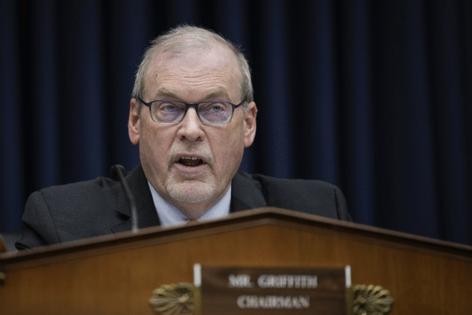Key House committee lays groundwork for health extenders
Published in News & Features
WASHINGTON — The House Energy and Commerce Health Subcommittee is planning to mark up legislation that would extend a slate of expiring health care provisions, subcommittee Chairman Morgan Griffith said Wednesday.
Griffith, R-Va., noted the bipartisan support for legislation as members look to prevent provisions from expiring as the end of the fiscal year approaches on Sept. 30. An aide said the panel is still finalizing the exact lineup.
“Mostly extenders that need to get done,” Griffith said when asked what legislation will be included. “Most of it, there may be some slight differences, but we expect most of it will be bipartisan.”
The provisions that are set to expire include telehealth flexibilities in Medicare coverage, which would be permanently extended though bipartisan legislation introduced in each chamber.
Some provisions of the law known as the Pandemic and All-Hazards Preparedness Act are set to expire as well. Those provisions had been temporarily extended by the fiscal 2025 continuing appropriations law.
Congress is inching up on a Sept. 30 deadline to fund the government as well, and some lawmakers have floated the idea of a potential health package to get through before the end of the year. Either is a potential vehicle for these health extenders.
Griffith said the committee hadn’t yet decided the length of some of these extensions, noting that some would vary by program.
“We could be working on some of that next week and some if it may be a little bit later,” he said.
Senate
The Senate hasn’t yet announced when it will consider next steps on some of the expiring health extenders.
“We’ve got so much piling up, so I can’t tell you how [Senate Majority Leader John] Thune is going to order it,” said Senate Health Education Labor and Pensions Chair Bill Cassidy, R-La., acknowledging that he was going to a meeting where that would be a question.
Thune has been seeking options to speed up the Senate nominations process to allow the body to more rapidly deal with other priorities, such as government funding.
The HELP panel holds jurisdiction over the Pandemic and All Hazards Preparedness Act, the special diabetes programs, the National Health Service Corps, and community health center funds — all of which face looming deadlines.
Meanwhile, Cassidy was optimistic that the Senate could get 60 votes on a separate bipartisan health bill if the timing issue was alleviated.
“We’ve got to get working on it, and so that’s the challenge right now. There’s so little time, and we’re getting tied up with nominations. It’s just killing us — the ability to get things done for the government,” Cassidy said.
Sen. Roger Marshall, R-Kan., a member of the Senate Finance Committee, said Wednesday that Cassidy will announce a package this week that could include pharmacy benefit manager overhaul, hospital pricing transparency and prior authorization reform proposals.
©2025 CQ-Roll Call, Inc., All Rights Reserved. Visit cqrollcall.com. Distributed by Tribune Content Agency, LLC.







Comments